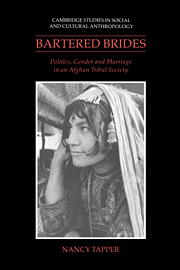Book contents
- Frontmatter
- Contents
- List of illustrations
- List of tables
- List of case studies
- Preface
- Acknowledgements
- Note on transliteration
- List of abbreviations and symbols
- Part I CONTEXTS
- Part II SOCIAL GROUPS AND MARRIAGE
- Part III IDEOLOGIES OF EQUALITY AND INEQUALITY
- 7 Brideprice and direct exchange
- 8 Rituals of marriage
- 9 Marriage choice
- Part IV CASE STUDIES AND STRUCTURAL IMPLICATIONS
- Notes
- References
- Index
- Cambridge Studies in Social and Cultural Anthropology
7 - Brideprice and direct exchange
Published online by Cambridge University Press: 29 August 2009
- Frontmatter
- Contents
- List of illustrations
- List of tables
- List of case studies
- Preface
- Acknowledgements
- Note on transliteration
- List of abbreviations and symbols
- Part I CONTEXTS
- Part II SOCIAL GROUPS AND MARRIAGE
- Part III IDEOLOGIES OF EQUALITY AND INEQUALITY
- 7 Brideprice and direct exchange
- 8 Rituals of marriage
- 9 Marriage choice
- Part IV CASE STUDIES AND STRUCTURAL IMPLICATIONS
- Notes
- References
- Index
- Cambridge Studies in Social and Cultural Anthropology
Summary
A basic and explicit principle in Durrani marriage is that the exchange of women between two men indicates a mutual recognition of status equality, while the single transfer of a woman by one man to another for brideprice indicates the recognition by the wife-giver of the potential or actual status superiority of the wife-taker (see N. Tapper 1981: 405 n. 4). The ascendancy of wife-takers is thus a possible interpretation of all brideprice marriages, but, in such marriages between Durrani households, the implicit inequality is contradicted by the general ideal of Durrani equality.
The phrases most often used by Durrani to refer to the state of marriage derive from the verb ‘to wed’ (wada kawel). However, Durrani also frequently differentiate direct exchange marriage and marriages for brideprice or money. I have called these two distinct modes, respectively, the symmetrical and the asymmetrical. In fact, each of these modes comprises three forms, distinguished indigenously in the one case but only analytically in the other. Linguistic usage here seems to relate directly to the meaning of the two modes: symmetrical exchange marriages are the primary means of expressing social equality and uniformity and they are treated linguistically as uniform in their occurrence and impact, while marriages of the asymmetrical mode create and emphasize status differences and are themselves verbally differentiated.
- Type
- Chapter
- Information
- Bartered BridesPolitics, Gender and Marriage in an Afghan Tribal Society, pp. 141 - 156Publisher: Cambridge University PressPrint publication year: 1991



